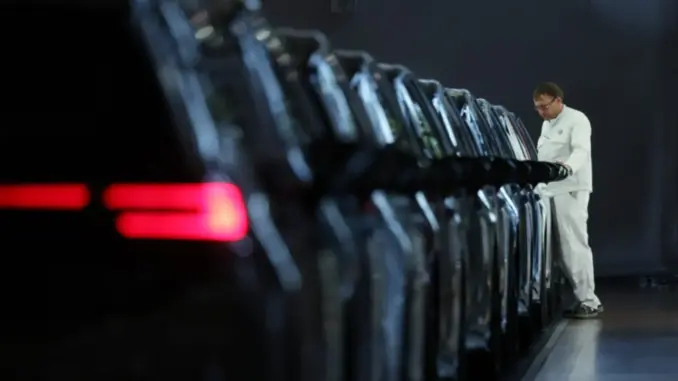
Europe’s ban on the sale of new diesel and gasoline cars and vans from 2035 has been pushed back into the spotlight.
The divisive matter, which was hailed as a landmark shift when the European Union adopted it in 2023, has been a prominent topic at the IAA Mobility motor show in Munich this week.
More than 150 executives from the region’s electric vehicle sector on Monday signed an open letter urging the European Commission, the EU’s executive branch, to “stand firm,” uphold the 2035 zero-emission target for cars and vans, “and back it up with bolder action.”
The signatories — including EV makers Volvo and Polestar, along with materials suppliers, battery producers and grid operators — said the announcement of the target has already spurred hundreds of billions of euros in fresh investment. Any dilution of the commitment, they argued, would undermine investor trust and hand a lasting competitive edge to international rivals, such as China.
The appeal came after a different letter released late last month from the leaders of the European Automobile Manufacturers Association (ACEA), a car industry lobby, and the European Association of Automotive Suppliers (CLEPA), an auto supplier body. Addressed to European Commission President Ursula von der Leyen, the organizations argued the EU’s 2035 carbon targets were “simply no longer feasible.” The letter was signed by Mercedes chief Ola Källenius, currently serving as ACEA president, and Matthias Zink, CLEPA president and CEO of Schaeffler’s Automotive Technologies division.
Rather, the auto industry groups said the 27-member bloc’s emissions reduction strategy “must be recalibrated” to protect Europe’s industrial competitiveness, social cohesion and the strategic resilience of its supply chains, while still preserving climate objectives.
ACEA represents 16 major Europe-based automakers, including Volkswagen, BMW, Ferrari and Renault.
German Chancellor Friedrich Merz also entered the fray on Tuesday. Speaking at the IAA Mobility forum, Merz said “one-sided political commitments to specific technologies are the fundamentally wrong economic policy path,” according to a CNBC translation. “They are not the path that will allow us to reliably achieve common goals,” Merz added. His remarks were widely interpreted as a veiled reference to the EU’s 2035 carbon regulation.
Crunch talks
The industry rift on this matter comes as car executives prepare to meet with the EU’s von der Leyen on Friday. The much-anticipated discussions, taking place as the EU re-examines parts of the 2035 ban on new diesel and gasoline vehicles, are projected to concentrate on how to manage the sector’s so-called “polycrisis.”
Europe’s auto industry faces a slew of issues, from rising manufacturing costs to U.S. tariffs, as well as supply chain disruptions and regulatory burdens.
Rico Luman, senior sector economist for transport and logistics at Dutch bank ING, said the upcoming strategic dialogue between the EU and the bloc’s largest automakers has reignited the argument over the regulation’s merits. European policymakers were fully aware of the restructuring and job cuts at Volkswagen, Luman noted, amid broader worries that shrinking employment in Germany’s traditional car sector could endanger even more roles. “We have had the automotive strategic plan with the flexibilisation of the 2025 standards and car makers are going through a tough year of competitive challenges with severe tariff-impact and margin setbacks,” Luman told CNBC by email.
Campaign group Transport & Environment, meanwhile, has urged the EU to stay resolute on its 2035 emissions target ahead of Friday’s dialogue on the future of the auto industry.
A spokesperson for the European Commission declined to comment prior to Friday’s talks. — CNBC’s Sophie Kiderlin contributed to this report.
See also: The Road Ahead for Autonomous Vehicles in New York City

Leave a Reply